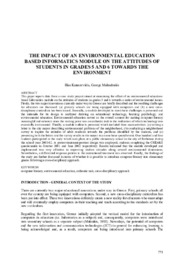| dc.contributor.author | Karasavvidis, Ilias | en |
| dc.contributor.author | Malandrakis, George | en |
| dc.coverage.spatial | CY - Λευκωσία | en |
| dc.creator | Karasavvidis, Ilias | en |
| dc.creator | Malandrakis, George | en |
| dc.date.accessioned | 2016-02-19T09:15:57Z | |
| dc.date.available | 2016-02-19T09:15:57Z | |
| dc.date.issued | 2003 | |
| dc.identifier.uri | http://hdl.handle.net/10797/14739 | en |
| dc.description | Περιέχει το πλήρες κείμενο | el |
| dc.description.abstract | This paper reports data from a case study project aimed at examining the effect of an environmental educationbased Informatics module on the attitudes of students in grades 5 and 6 towards a series of environmental issues. Firstly, the two major innovations currently under way in Greece are briefly described and the resulting challenges for educators are discussed: (a) primary schools are being equipped with computers and (b) a new crossdisciplinary curriculum has been issued. Secondly, a module developed to meet these challenges is presented and the rationale for its design is analyzed drawing on educational technology, learning psychology, and environmental education. Environmental education served as the overall context for making computer literacy meaningful and coherent since the starting point was an authentic task to the realization of which technology was essentially instrumental. Thirdly, a module outline is presented which included three main activities: (a) writing a letter to the city mayor describing environmental problems of the neighborhood, (b) conducting a neighborhood survey to inquire the attitudes of adult residents towards the problems identified by the students, and (c) presenting both the letters and the survey results to the mayor in an one hour special event. One hundred and four students participated in the study which took place at a public elementary school in the city of Rethimno during the school year 2001-02. A pretest-treatment-posttest design was employed, students completing the CHEAKS questionnaire in October 2001 and June 2002 respectively. Results indicated that the module developed and implemented was very effective in improving student attitudes along several environmental dimensions.
Nevertheless, a differential response pattern to the instructional treatment was observed. Finally, the findings of the study are further discussed in terms of whether it is possible to introduce computer literacy into elementary grades following a cross-disciplinary approach. | en |
| dc.language.iso | eng | en |
| dc.publisher | Department of Educational Sciences, University of Cyprus | en |
| dc.relation.ispartof | Learning and teaching | en |
| dc.rights | info:eu-repo/semantics/openAccess | en |
| dc.rights | Open Access | en |
| dc.source | CBLIS Conference Proceedings 2003 Volume I: New Technologies and their applications in education | en |
| dc.title | The impact of αn environmental education Based informatics module on the attitudes of students in grades 5 and 6 towards the environment | en |
| dc.type | info:eu-repo/semantics/conferenceObject | en |
| dc.subject.uncontrolledterm | Computer literacy | en |
| dc.subject.uncontrolledterm | Environmental education | en |
| dc.subject.uncontrolledterm | Authentic task | en |
| dc.subject.uncontrolledterm | Cross-disciplinary approach | en |
| dc.contributor.conferenceorganizer | Learning in Physics Group, University of Cyprus | en |
| dc.contributor.coordinator | Constantinou, Constantinos P. | en |
